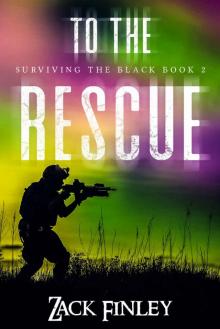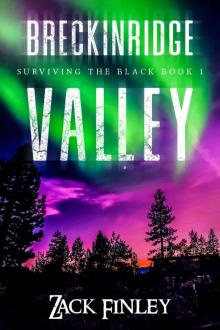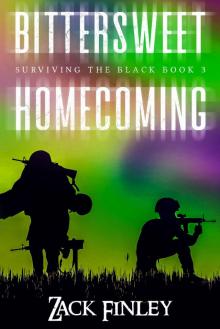- Home
- Zack Finley
To the Rescue; Surviving the Black--Book 2 of a Post-Apocalyptical Series
To the Rescue; Surviving the Black--Book 2 of a Post-Apocalyptical Series Read online
To the Rescue
Surviving the Black—Book 2
By Zack Finley
Table of Contents
Summary of “Breckinridge Valley”
Chapter 1
Chapter 2
Chapter 3
Chapter 4
Chapter 5
Chapter 6
Chapter 7
Chapter 8
Chapter 9
Chapter 10
Chapter 11
Chapter 12
Chapter 13
Author’s note:
List of characters
◆◆◆
Summary of “Breckinridge Valley”
A lot of things happened in “Breckinridge Valley; Surviving the Black-Book 1” to set the stage for “To the Rescue; Surviving the Black-Book 2.” The world as we know it died in mid-October 2018 when an immense Coronal Mass Ejection from our sun wiped out the electrical grid worldwide. “Breckinridge Valley” describes the events leading up to and the immediate aftermath of the crash for a small group of multi-generational survivors in a rural area of northeast Tennessee.
“To the Rescue” takes up their saga in the third month after the crash and is meant to be read after “Breckinridge Valley.” To help bridge between the two books, I’ve appended a list of important names and places to aid the reader.
◆◆◆
Chapter 1
It was nearly Christmas as we measured time the old way. In the new way, it was month three of life in America without power, without civilization. We shifted from worrying about a politician’s latest antics to hoping our kids survived to become adults.
My name is Jeremy Breckinridge, and I knew life was better here in rural Tennessee than it was in any population center. Worldwide most everyone lucky enough to still be alive was worrying about clean water, food, shelter, and safety.
Academia called it a coronal mass ejection, or CME. When the sun vomited in October 2018, it knocked down our flimsy electrical distribution system and everything we’d come to rely upon as a nation.
From what we could learn from HAM radio contacts, the whole industrialized world was knocked back a few centuries. While in parts of Africa, South America, and Asia, I doubted it made any real difference to their lives.
My family has been survivalists for generations. We still lived in Breckinridge Valley where my great-great-great-granddaddy homesteaded before Tennessee was even a state. We lived on the Mecklin River in northeast Tennessee just outside of the Mecklin County seat of Huntsville.
Before the crash, Huntsville was a sprawling village of 1,000 souls. Now I’d be surprised if it had half that. Our county was a heavily forested recreational paradise. Before the crash.
The predicted influx of refugee hordes from the cities of Knoxville or Chattanooga didn’t materialize. Not sure if we dodged that aspect of the apocalypse or whether it was something to look forward to.
Since the crash, our problems were local. We repulsed two threats to life in Breckinridge Valley.
One from a militia, whose members were long on guns but short on combat acumen.
The other was local law enforcement. Deputies ousted our sheriff and claimed all the local resources for their own. They abandoned “protect and serve” to adopt a new motto, “Give me your food and then I’ll kill you.”
My family’s basic plan for most disasters, including a CME, was to keep a low profile. Everyone would pull back to Breckinridge Valley, grow enough food to feed our family and friends and defend ourselves if attacked. For decades our main defensive strategy was to blow the bridge over the Mecklin River leading to us. If you couldn’t reach us, you couldn’t hurt us.
With food and physical security established, we’d pull ourselves up by our bootstraps. Over the past 70 years, generations of Breckinridges had planned and stockpiled things needed to survive in a powerless world. Once the stockpiles were used up or wore out, we hoped our people would have the knowledge, skills, and resources needed to thrive. And maybe re-establish a better civilization in the ashes of the last one.
That plan got away from us. First, when some of our members brought entire neighborhoods from Huntsville into Breckinridge Valley for protection. That decision nearly doubled the population of the Valley.
The second deviation was our support of a group of hardworking seniors building a viable community in the Huntsville middle school. Their lives were snuffed out when Mecklin County sheriff’s deputies stole their food, kidnapped, and murdered them.
The worst rogue deputies recruited drug dealers and criminals to augment their ranks. Families of several deputies became hostages and slaves. This well-armed group occupied the Mecklin County Justice Center where they hoarded supplies from local stores.
My security team attacked the justice center and killed or captured those inside. We never learned where the seniors were dumped, and the patrols we sent looking for them came back empty.
Valley leadership voted to establish a forward operating base in the justice center. In typical army lingo, we dubbed it FOB Justice. It became the Valley’s satellite operation. My brother Steve and his wife Mandy were placed in charge of it.
Everyone was still working through what a “satellite operation” meant. It was uncharted territory, something not in our original survival plan.
Our first challenge was what to do with our prisoners. Only four men, all former deputies, were still alive after our raid and their subsequent trial. We also freed 18 women and children who were kept as hostages and slaves. Valley families adopted the five orphans.
The rest weren’t welcome to move into the Valley.
Steve and Mandy were now struggling with rules of conduct expected for anyone receiving asylum in FOB Justice.
Valley residents were already relocating to Justice. Some moves were temporary just to get the new facility operational and defensible. Others saw it as an opportunity to get in on the ground floor with a fresh start.
Today much of the burden for keeping FOB Justice safe fell to Force Beta, comprised of 20 ex-Rangers I’d recruited before the crash. They were reinforced by Force Gamma, 20 hand-picked graduates from the Valley defense force.
After securing FOB Justice, I sent some troopers from Force Beta and Gamma from the FOB back to cover the Valley. I wasn’t expecting an attack, but they were the best-trained security forces we had.
While Force Beta and Gamma had specialized defensive assignments during an attack on our facilities, most of the time they worked regular jobs commensurate with their other skills. Now with two locations to protect, maintaining a solid core of our most skilled warriors in both places was just one more competing variable to consider.
The biggest challenge in securing FOB Justice was its size at more than 40,000 square feet. The sprawling building was approachable from all directions with the back half close to a heavily wooded area. The parking lots provided great fields of fire for three sides, but we didn’t have enough SAWs (squad automatic weapon) to mount at every spot we needed one. Justice had a lot of doors and even more ground level windows.
While FOB Justice was a security nightmare, it also had 130 jail beds, lots of rooms, a full solar system, a small clinic, kitchen and laundry, and a nearby well. It had a huge garden plot with lots of room for expansion. The deputies emptied the contents of many Huntsville stores, including the pharmacy and dentist, and stored the plunder inside the building.
The jail walls were hardened concrete, making it a veritable fortress. Steve intended to rewire the doors and add other security t
o keep out intruders. After we finished our adjustments, I believed a few well-armed defenders could hold out against a far superior force until reinforcements arrived.
We needed a safe travel corridor between the Valley and FOB Justice. The 5-mile corridor would also link the two areas with some type of secure communication.
So far, the farthest security zone from the Valley we monitored was FOB Echo, about halfway between the two main sites. We regularly observed it remotely using wireless trail cameras. I didn’t know enough about the system to understand if we could expand that all the way to FOB Justice. Our tactical radios had a maximum 3-mile radius so while we could talk to anyone in FOB Justice talking to people in the Valley wasn’t possible, except by CB.
I was with two of my Rangers, Matt, and Buzzer, looking at the FOB Justice windows. Keeping people from sneaking in through the many windows was a major concern. But we couldn’t afford to use every piece of plywood in the Valley to cover them.
Deputy Allen was the ex-leader of the deputy revolt. He was a murderer and child rapist who was still at large. During our attack on the Justice building, Allen escaped through one of the windows. I hoped he’d come back so we could end him. I suspected he was cunning enough not to get within our reach.
We were concerned he might join the Oneida police officers holed up in that city’s Walmart. Oneida was the largest town in Mecklin County and was only a few miles north of Huntsville. When the lights went down, Oneida police secured the Walmart for public use. After the lights stayed off, things changed. We still didn’t know what was going on up there.
In the early days of the crisis, we heard some residents attempted to take over the Oneida Walmart at gunpoint. They were repulsed.
We believed the police, their families and others were still dug in at the Walmart, willing to shoot anyone who attempted to get too close.
The population of Oneida was only 3,600 before the crash, but they had a lot more than three times the commercial base of Huntsville. It also was home to Mecklin County Hospital.
As part of the Valley’s disaster plan, all of our allies who lived in Oneida evacuated to the Valley before the power went down. Worrying about Oneida was not in our “Plan.”
The county airport and the National Guard Armory were between Oneida and us. Not that the National Guard was a significant force right now. Last we knew, Major Thomas was holed up at the armory with four men waiting for instructions.
Major Thomas gave the late sheriff five Humvees in the early days after the crash. The Valley now owned them. We suspected Major Thomas would want his Humvees back. That suspicion was one of the reasons we hadn’t contacted him in weeks.
With Allen on the loose, we needed to know what was happening in Oneida. I couldn’t wait until we had FOB Justice secure.
I caught up with Zeke, who was inventorying the weapons and equipment we gained from the sheriff’s office. Zeke was our armorer.
“They had some nice SWAT gear, and the rest is better than most civilians have, but we’ve got better. Lots of ammo, the sheriff must have gotten a great deal on it. It should help us with civilian weapons training without dipping into the good stuff,” Zeke said.
“I need three guys for a recon patrol of the Oneida area,” I said. “I need at least one who knows the area pretty well.”
“Scott probably knows the area best, but he’s still recovering from the chest wound he got from the Lloyd Mountain Militia. Ben lived in Oneida, so he’d be a good choice,” Zeke said. “Joel and Pete could use the refresher, you want me to tell ‘em?”
“Yeah, they may want to get some sleep today and plan to leave from here at dusk. Suppressed weapons, we want this to be stealthy,” I said.
“I’ll have them pack those suppressed pistols, too. When do you want to brief them?” Zeke asked.
“Right away, then they can pick up the gear they need and catch some sleep,” I said. “I’ll pick up Joel, who is still here and we’ll meet Ben, and Pete at the armory.”
“You should include Scott in the briefing since he knows the place best. We found a lot of maps in the sheriff’s office, I’ll pull some for the recon team to use,” Zeke said. “You should all meet up in the Valley. I’ll get your maps.”
I’d talk to Roger, too, he’d have some insight into what we should be watching for. I’d radio Sally at the radio hut when we got to FOB Echo asking him to meet us. Just another reminder we needed to fix the communication disconnect.
Roger was my dad’s best friend and executive officer. He was a Vietnam War vet, leader of the Valley defense force, and intelligence chief. I’m not sure what he did in his spare time.
Until we permanently secured the corridor between FOB Justice and FOB Echo, anyone traveling between the two locations was required to either be in a Humvee or in a vehicle escorted by one as a safety precaution.
Most Valley adults were trained to shoot before the shit hit the fan. Some of our new recruits still needed marksman training and would probably not be assigned to Justice until they were. Trained shooters were assigned automatic rifles and required to keep them nearby at all times. They were the backbone of the Valley defense force.
We now had seven armored Humvees, but only four had operational turrets. Two were parked in front of Justice. I left the Humvee with the M249 SAW turret at Justice and took the other one.
This still left a variety of vehicles at Justice if they needed to evacuate the base.
By the time Joel and I arrived at the armory, Scott, Ben, and Pete were waiting for us
Joel spread the sheriff’s maps on the table to help plan the mission. We were looking them over when Roger came in with Glen, one of his teammates. We’d worked with Glen to evacuate the last big group of civilians from Huntsville.
“Before Glen retired, he worked for the city of Oneida in their road department. If anyone knows the ins-and-outs, he does,” Roger said.
“We need to know the situation in Oneida,” I said. “Who is holed up in Walmart, who is opposing them. What everyone else is doing. Is there any semblance of civilization left? What has happened at the hospital? Where are the roadblocks? If they are manned, then by whom.”
“Then a reconnaissance in depth,” said Ben. “Not just a quick in-and-out.”
“That depends, we need to know if their chaos or militancy poses a significant threat to us. Communicating that to the Valley overrides any other mission parameter,” I said. “I’m very concerned Allen will link up with some group. If he exaggerates the plunder and minimizes the resistance, his new comrades might come for the goodies stored at the jail.”
“Okay, you want to learn what we can about the armed factions, then assess the threat level they pose. Sounds like the rest is gravy,” Ben said.
“Pretty much, but if you don’t bring back the rest of the intel, we will need to send a second recon team to follow up. I’d like to get what we need in one trip. If you can,” I said.
“We will be too far out for our radios to connect, so we’ll need a set of CB codes and protocols,” Ben said.
“Someone will man the CB radio in FOB Justice,” I said. “You should be in their range.”
“I’ll handle the radio,” Scott said, “to free up someone else to deal with tougher stuff. I’ll get with Sally, and we’ll be ready when you leave tonight.” Sally was the Valley’s radio guru.
“Remember this is recon only, protect yourself if you need to, but I’d rather they never know anyone from here came visiting,” I said. “I’ll leave you to plan your mission. Let me know the details before you leave, including how long you think you will be out. Force Beta assigned to FOB Justice will by the QRF (quick response force) in case you get in trouble. They will come running with the armed Humvee. The Valley will then backfill to FOB Justice.”
Roger stayed, having worked many years in Oneida. He also knew a lot of the players. Scott jogged off to meet up with Sally.
I found myself with nothing to do and left to brief my parents,
Claire and Aaron Breckinridge.
I was disappointed my mom no longer served coffee. She kept a pot of hot water on top of her wood stove much of the time. She offered some of her latest faux-coffee blends. Finding a locally sourced replacement for coffee and tea was one of her personal projects. My mom was a strong woman. She was about 5’6” tall and probably weighed about 150. Most of that was bone and muscle. She didn’t work out or go to the gym. She was a farm wife. She tossed hay bales into the back of the pickup one day and canned vegetables the next. Before the crash, her garden won her blue ribbons at each year’s county fair, and her pies were unbelievable. She was also a programming and electronics whiz.
My dad resisted the offer, preferring pure hot water, instead.

 To the Rescue; Surviving the Black--Book 2 of a Post-Apocalyptical Series
To the Rescue; Surviving the Black--Book 2 of a Post-Apocalyptical Series Dire Prophecy
Dire Prophecy Duchy Unleashed
Duchy Unleashed Mad Toffad's Keep
Mad Toffad's Keep Breckinridge Valley: Surviving the Black--Book 1 of a Post-Apocalyptical series
Breckinridge Valley: Surviving the Black--Book 1 of a Post-Apocalyptical series Bittersweet Homecoming; Surviving the Black--Book 3 of a Post-Apocalyptical Series
Bittersweet Homecoming; Surviving the Black--Book 3 of a Post-Apocalyptical Series